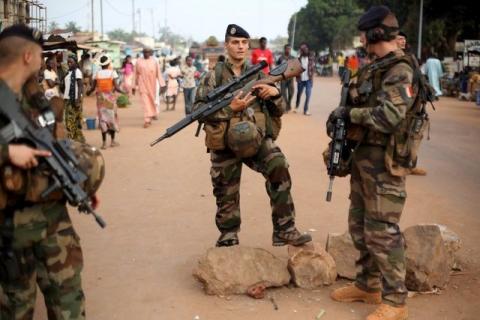Advertisement
Central African Republic votes in crucial referendum
BANGUI (Reuters) - Voters in Central African Republic cast their ballots on Sunday in a constitutional referendum seen as crucial to ending nearly three years of violence, defying a call by rebels for the process to be canceled.
The former French colony descended into chaos in early 2013 when mainly Muslim Seleka rebels seized control in the majority Christian nation.
Their abuses led to reprisals by Christian anti-balaka militias, sparking inter-religious violence that has killed thousands and displaced nearly a million in a de facto partition of the country.
The expected approval of the draft constitution would pave the way for Dec. 27 polls to elect a new president and parliament, restoring democratic rule in the wake of two successive transitional governments.
The referendum also serves as a dress rehearsal for the vote, testing whether elections officials can overcome logistical and security challenges in a nation carved up by rival rebel and militia factions.
Voting got off to a late start in many neighborhoods in the sprawling, riverside capital Bangui, but queues formed in front of polling stations across the city.
However, gunfire that began overnight around the PK5 neighborhood, Bangui's main Muslim enclave, continued into Sunday morning. Medical charity Medecins Sans Frontieres said it treated six people from PK5 and the nearby Gobongo neighborhood for gunshot wounds.
"If we have these, it's so we can vote," said resident Karim Bashir Abakar, holding up his voter card. "But since last night there's shooting everywhere in PK5. They're trying to stop us from voting. We've had enough of guns. We want to go vote."
Residents of the isolated enclave, which was visited by Pope Francis during a trip to Bangui last month, marched to the headquarters of the country's U.N. peacekeeping mission, MINUSCA, to complain they were unable to cast their ballots.
The mission responded by sending soldiers to protect voters and poll workers in PK5.
"NOT READY"
Despite the deployment of the 11,000-troop strong MINUSCA last year and the presence of French soldiers, sporadic violence has continued.
Following months of relative calm in Bangui, clashes in late September sparked a fresh wave of inter-religious fighting that has killed more than 100 people in and around PK5, according to rights campaigner Human Rights Watch.
In a statement distributed on Sunday, the former Seleka coalition said conditions, including the return of refugees, were not in place to allow for the elections to go ahead.
"CAR (Central African Republic) isn't ready to organize inclusive, democratic, credible, safe and transparent elections," it said. "A third transition with a new consensual team is needed, the elections ... and the referendum must be canceled."
Earlier this month, Nourredine Adam, the leader of one of Seleka's main factions, threatened to block the polls in areas under his control.
Government spokesman Dominique Said Panguindji acknowledged there had been several incidents in Bangui and elsewhere in the country. However, he said that conditions were generally calm and turnout was healthy.
"The overall opinion is that there must not be a third transition. We must have elections. This is the will of the people," he said.
The U.N. said it had dispatched soldiers throughout the country to ensure the security of voters.
"We are warning all groups and individuals who want to intimidate voters. MINUSCA will not allow it," said the mission's spokesman Vladimir Montiero.
Central African Republic has seen a succession of coups since becoming an independent nation in 1960, and the resulting instability has eroded state authority.
The proposed constitution limits the power of the president and increases that of the parliament, creating a senate to compliment the already existing national assembly. It also establishes a Special Criminal Court to try serious crimes.
(Reporting by Anthony Fouchard and Sebastien Lamba; Additional reporting and writing by Joe Bavier in Abidjan; Editing by Mark Potter)



















Add new comment